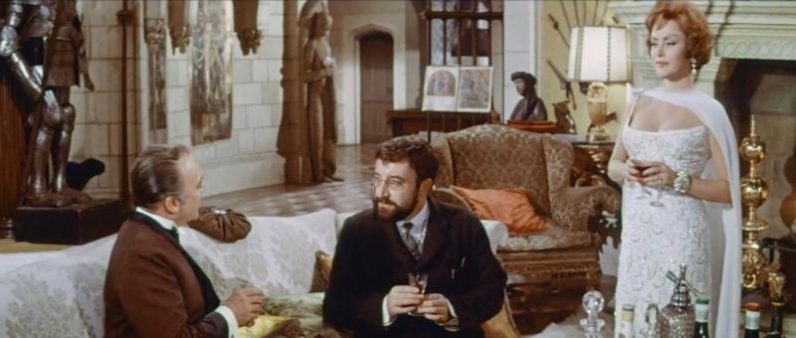
The 1961 movie “Mr. Topaze” marked comic actor Peter Sellers’ only directing credit. The Catholic News Service classification is A-II — adults and adolescents. Not rated by the Motion Picture Association. (CNS/GIMP via Film Movement)
NEW YORK (CNS) — The 1961 British comedy “Mr. Topaze” (Film Movement), originally distributed by Fox, is unusual in a number of respects. For one, it’s the only feature for which celebrated comic actor Peter Sellers (1925-80) took directing credit. For another, it was almost lost, a sad fate usually reserved for much older movies.
The few surviving prints of the film, which was released in the United States in 1962 as “I Like Money,” are in the collection of the British Film Institute’s National Archive. A newly restored version of this adaptation of Marcel Pagnol’s 1928 French play — the basis for several other big-screen iterations over the years — is currently streaming on Film Movement Plus (https://www.filmmovement.com/mr-topaze).
Sellers also stars as the titular character, a timid but rigidly honest schoolteacher in an unnamed French town. Topaze, as early scenes establish, is in love with Ernestine (Billie Whitelaw), the daughter of his perpetually flustered headmaster, Monsieur Muche (Leo McKern).
[hotblock]
Though intimidated by Muche, Topaze is aided in his wooing by his colleague and admiring friend, Tamise (Michael Gough), and his prospects, at first, seem promising. But a visit to the school by an imperious baroness (Martita Hunt) who has three grandchildren enrolled there, leads to disaster.
The baroness threatens that unless Topaze alters the grades of one of the pupils under her care for the better, she will withdraw all three. Despite cajoling from Muche, Topaze refuses to compromise his integrity by buckling under to the baroness’ demand — and is promptly fired.
Cast out into an unsympathetic world, naive Topaze soon falls into the clutches of Paris-based swindler Castel Benac (Herbert Lom) and his mistress, musical comedy actress Suzy Courtois (Nadia Gray). At Courtois’ urging, Castel Benac employs Topaze, whom he regards as a useful idiot, as the front man for one of the shady enterprises by which he advances his corrupt schemes.
The duo initially succeeds in playing on Topaze’s innocence. But, in the end, they get more than they bargained for from the underhanded arrangement.
Understated humor is the hallmark of this restrained and sophisticated parable, which begins as a comedy of manners but ends as a somewhat cynical tale of moral downfall. Though the note of savvy pessimism on which the story ends is mitigated, “Mr. Topaze” leaves in its wake a melancholy chill that may go a long way to explaining why it failed at the box office. Viewer reactions may be quite different 60 years later.
As for any objectionable content, the film is mostly harmless by today’s standards. But it’s interesting to reflect on the shadowland it may have occupied both as an import and as a picture made in the waning days of the Hollywood production code.
There’s a bit of comic fumbling with clothes and cut-off sentences that are clear in their implications, at least to grownups. But it’s made explicit in the dialogue that the ethical standards Topaze has set for himself include remaining chaste until marriage while the relationship between Castel Benac and Courtois, though its nature is never spelled out, is of a piece with their generally fallen state.
In the end, Topaze is the antithesis of Sellers’ most popular movie persona, Inspector Clouseau. The latter ultimately, and ironically, succeeds despite his impenetrable dimwittedness. Topaze eventually clues in — to his material profit but at the price of losing his soul.
The film contains an implied nonmarital relationship, a flash of partial nudity, a few mild oaths and vague sexual references. The Catholic News Service classification is A-II — adults and adolescents. Not rated by the Motion Picture Association.
***
Mulderig is on the staff of Catholic News Service.
PREVIOUS: Just what is the truth about Norma McCorvey?
NEXT: ‘Shirley’ writes a suspense drama with literary heft


Share this story